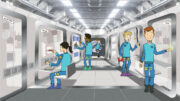Have you ever wondered how Father Christmas manages to deliver presents to millions of children across the world – all in one night?
Well, Santamory is in charge of all the science and technology at the North Pole and he’s going to show you some of the statistics behind the biggest night of the year…
Number of children visited
There are roughly 2 billion children worldwide.
Christmas is traditionally a Christian holiday so, assuming Santa only visits Christian children, that’s still a whopping 700 million children to visit!
If we also assume there’s three children in each house, that’s 233 million stops that Santa’s sleigh has to make in just one night!
There may be a few households where all the children have been naughty… but our science doesn’t stretch that far so we’ll ignore those!
Distance travelled
So if we assume those 233 million houses are spread fairly evenly around the world…
The Earth’s surface area is 510 million kilometres. To keep things simple, we’ll pretend the Earth is a square map rather than a globe, so each stop between houses will be around 1.47 kilometres (0.91 miles) apart.
That means Santa’s sleigh has to travel a total distance of 342,510,000 kilometres (or 212,030,000 miles)!
You’d have to be going pretty fast to manage that in one night…
Speed of sleigh
Father Christmas is incredibly smart so he’ll know to travel from east to west with the Sun. That way, he’ll maximise his available night-time.
Assuming children sleep for eight hours, he has 24 hours plus those eight to finish the job in.
Travelling a distance of 342,510,000 kilometres in 32 hours gives a speed of 10,703,437.5 kilometres per hour (6,650,807.72 mph) – which is a little under 1,800 miles per second!
That’s not even including the time taken to deliver the presents and polish off any mince pies he’s been left!
As a comparison, the fastest-moving man-made object in history – the space probe Voyager 1 – manages a less impressive 10.8 miles per second.
So Santa has to get a move on if he’s going to make it back to The North Pole before sunrise!
You can listen to every episode below…
The Science of Christmas with support from Institute of Physics, The Royal Aeronautical Society and The Institution of Engineering and Technology.
Add a comment



 Fun Kids is on DAB Digital Radio in the UK!
Fun Kids is on DAB Digital Radio in the UK! 


 Listen online -
Listen online - 